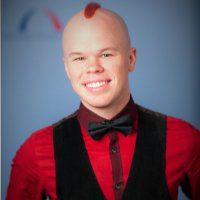50 States 50 Bills: A call to end conversion therapy
April 3, 2018
700,000 LGBTQ people have received conversion therapy in the United States, half of them were in their youth when the therapy occurred.
This is exactly what happened to Samuel Brinton. Brinton is the Head of Advocacy at The Trevor Project, an initiative to prevent LGBTQ youth suicides. He is also a Nuclear Scientist responsible for advising elites in Washington D.C. on nuclear policy.
Brinton was born to Southern Baptist missionary parents who found out he was gay after an innocent conversation when he was young about a childhood friend named Dale. Brinton and his friends had found a Playboy magazine by accident, and Brinton quickly informed his parents. As his parents warned him about the danger of having sexual feelings toward others, Brinton divulged that he sometimes had sexual feelings about his best friend Dale.
“I told him about Dale and my father’s face falls. He came toward me, and then I woke up in the emergency room because he had punched me so hard,” Brinton said.
Brinton consequently was put into conversion therapy by his parents, where he received aversion therapy techniques. He compared this to smokers who put a rubber band around their wrist and snap it each time they crave a cigarette. His therapist used aversion therapy to try and create a negative psychological relationship between him and his sexual feelings toward men. The forms of therapy he was subjected to were much more intense than just the snap of a rubber band.
“I was tied to a table while needles were shoved into my fingers,” Brinton said. “Electric shock went through my body while porn was playing.”
Brinton had several failed suicide attempts before the conversion therapy finally stopped. According to The Trevor Project website, LGBTQ teens contemplate suicide at three times the rate of heterosexual youth.
“We should never be forcing a child to change something that I don’t personally think they can change,” Brinton said.
The Trevor Project is a movement for which Brinton advocates that reaches out to the adolescent LGBTQ community. Brinton was attending college at Kansas State University when he was finally able to embrace his sexuality. He does not want this to be the case for other youth who are currently undergoing conversion therapy, or who are simply growing up ashamed of their sexuality.
“We want to pass a law that says that if you are a licensed physician, you cannot practice conversion therapy on any person under the age of 18.” Brinton said.
Brinton is also working to charge pastors and therapists who engage in conversion therapy with consumer fraud. This type of fraud occurs when deceptive practices result in financial loss for the consumer of a product. In this case, conversion therapy is the product, and has been proven repeatedly to be ineffective.
“Time after time we’ve sued our therapists for consumer fraud, for charging us thousands of dollars for doing a really great job at turning us straight,” Brinton said.
The Trevor Project has put an end to Exodus International, an organization that fostered and encouraged conversion therapy. The organization has since reformed as Restored Hope Network.
Brinton advocates for The Trevor Project as his day job, however he refers to himself as a nuclear physicist by night. Brinton worked on the Iran Nuclear Deal. His job was to go to Iran and learn the details about what was happening, and return to the United States to explain it to congress. After the deal went through, Brinton attended a dinner at the White House, where he had the opportunity to explain The Trevor Project to sitting President Barack Obama.
“He asked me what I did when I was not doing nuclear work,” Brinton said. “I said that I work to end conversion therapy. He asked me what conversion therapy was. I realized this was my moment, this was my elevator pitch to the president. Two weeks later on the front of The New York Times, the president of the United States called for conversion therapy to end.”
Although steps in the right direction have been taken, Brinton stressed that the work is not done. He wants all 50 states to pass a law that eradicates conversion therapy—if not for ethical reasons, for the reason that it is cost ineffective it does not work.
Brinton urged students to take a stand. To join the campaign, text the letters “TREVOR” to 40649 to receive updates on when the project is active in Kansas. He also urged students to contact their legislators to demand change and end conversion therapy.
“We are going to submit a bill in 2019,” Brinton said. “I would love Washburn to be a reason that we do that.”




